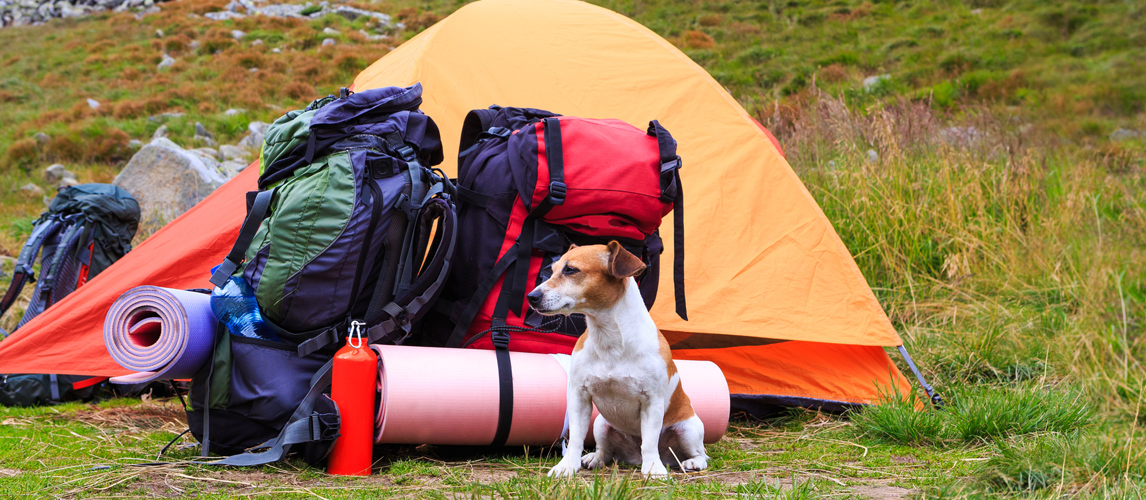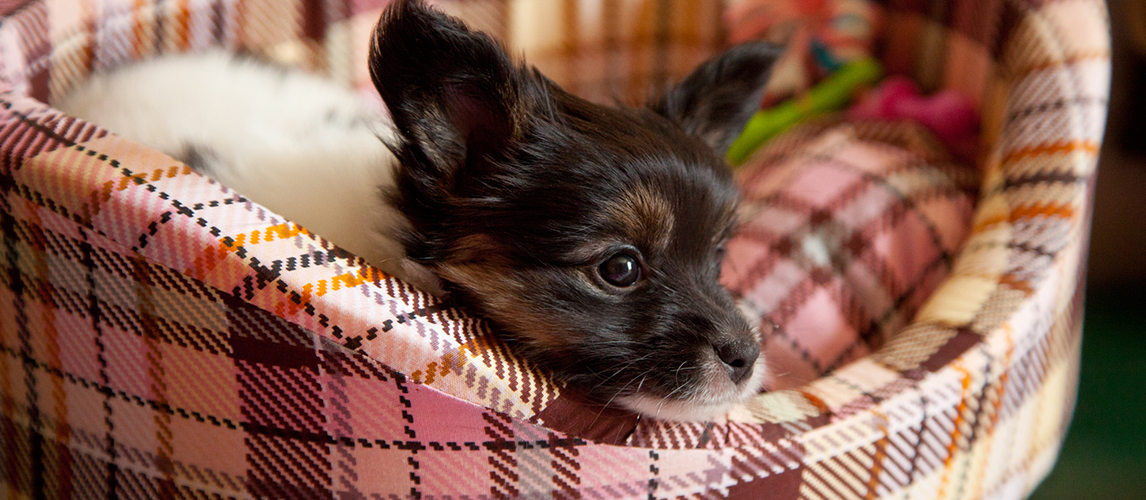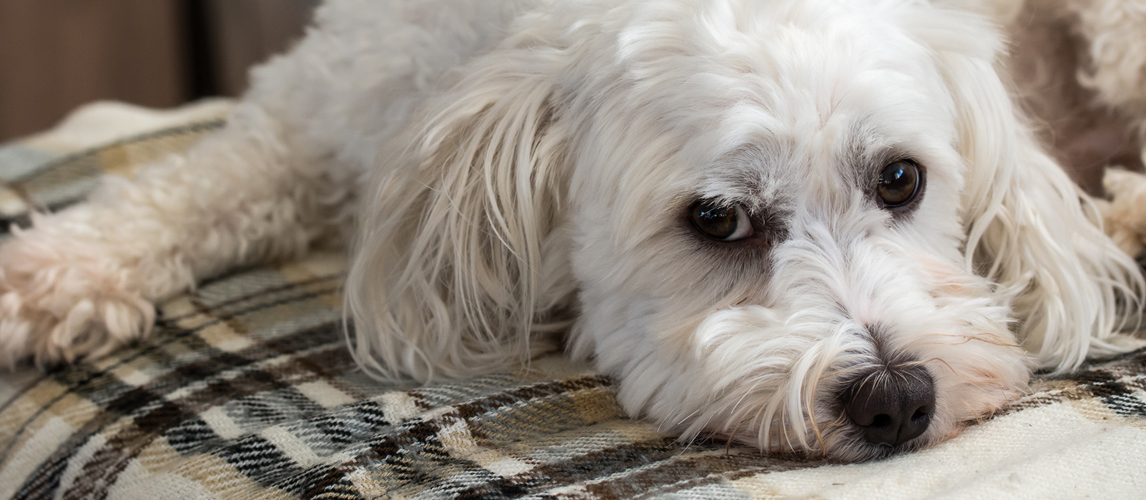Adopting a puppy is like being a new parent in many ways. And while there are plenty of joys, there are also more than a few challenges. One of the main obstacles to overcome is getting your little pup to sleep through the night. Do the right things early and you will save yourself many sleepless hours in the future. Your puppy needs an awful lot of sleep to begin with. In fact, anywhere between 18 and 20 hours is perfectly normal. Of course, not all of this is going to occur at night. Your puppy is going to need to take a lot of naps throughout the course of the day as well.
Unfortunately, human and puppy sleep schedules don’t line up. So, we have compiled a list of top tips on puppy sleep training.
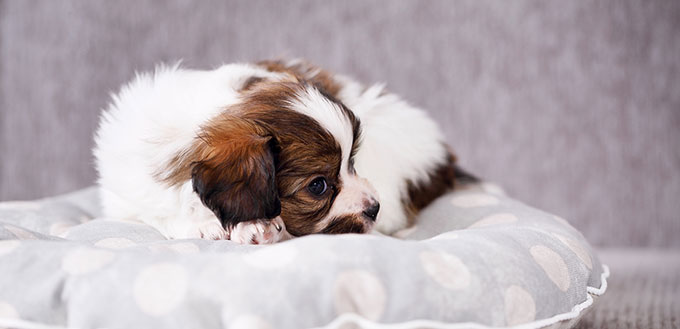
Importance of Sleep
Sleep is vital to the healthy growth and development of your puppy. It contributes to the development of the central nervous system, as well as the immune system, muscles, and brain. You may be surprised by just how much your new puppy needs to sleep, but this gradually starts to decrease as they get older. The internal clock of puppies is totally different from our own, and there is no point in trying to keep them up when they are ready to sleep. You can expect several naps throughout the course of the day, along with the big sleep at night that you need to get them used to.
How to Get a Puppy to Sleep
Create a Nice Sleeping Environment
For many of us, we need everything to be just right before we are able to drift off to sleep. The same goes for your pooch as well. And while it may be the eventual goal to have your dog sleep in bed with you, to start off with, it is better that they sleep in a dog crate. This is because your puppy won’t be able to control their bathroom habits through the night yet, and you don’t want to wake up with any unpleasant surprises in bed with you! While it may be a crate, you still need it to be a comfortable place to sleep. Line it with plenty of fluffy towels and blankets. For young puppies, you may want to go for the waterproof options which are easier to clean.
Related Post: Dog Blankets
If you do choose crate training a puppy at night, you are still going to have to wake up in the night as puppy’s bladders are not built to last more than a few hours. As a general rule of thumb, a puppy can hold their bladder for as many hours as they are months old. When you do take your dog out for a potty break, be wary about getting them overexcited. Otherwise, they will want to play, and you are going to be kept up in the middle of the night for a lot longer.
Read here our guide on Indoor Potty for Dogs.
Don’t Give in to Your Pup’s Begging
When your puppy starts to form a strong bond with you, they may well want to extend this to spending the night in your bed. But if you give in to their begging and whining a few times, it is more likely that your pup will be sleeping with you forever. If you have already made this choice, it’s fine, but if you want your dog to sleep in their own bed, you need to establish good habits at the earliest possible opportunity.
Let Your Dog Sleep Undisturbed
While it may be tempting to let your puppy sleep on your lap all the time, if they get used to this, they may find it hard to sleep any other way. It is best to leave your dog to their own devices when they are asleep, but when they seem to be tired, you could lead them to their bed to establish this as a regular sleeping environment. Bear in mind that puppies need many hours of sleep every day, and they are not only going to sleep at night. One minute they could be tearing around the house, while the next they will suddenly be drifting off to the land of nod!
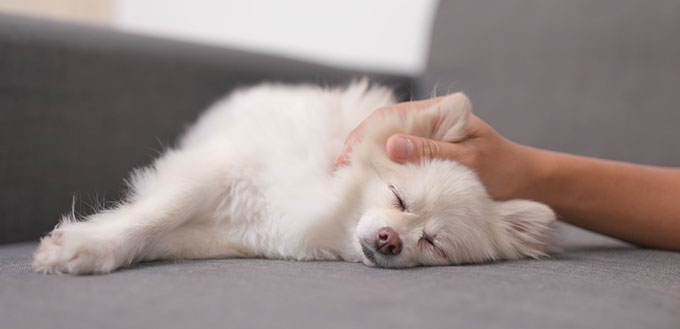
Give Your Dog Plenty of Exercise
Puppies are going to find it much easier to sleep as the end of a long day if they are exhausted. Even if your puppy Is not allowed out of the house yet as they have not been fully vaccinated, you still need to provide enough mental and physical stimulation. If you have an enclosed yard, this also provides a great space where you can give your little pooch a workout. Invest in a range of toys and rotate them on a regular basis to hold your pup’s interest. Work on some basic training exercises together. Start to get your dog used to walking on a leash. Use puzzle toys to engage your dog’s brain while they are seeking out their treats rather than just offering them up with no effort. A combination of all of these things will leave your dog exhausted when it comes around to bedtime – and they are more likely to be able to get their forty winks.
However, there is such a thing as letting your dog get overtired. If your pup is overstimulated, this can lead to hyperactivity and a loss of self-control. Dogs who never learn to calm down are also more likely to suffer from joint and heart issues. A few signs that your dog is overtired include them yawning a lot, sniffing the ground, excessive panting or lip licking, high thirst, and panting.
Create a Bedtime Routine
A bedtime routine is a great way of preparing your puppy to go to sleep. Dogs are creatures of habit and if they know that the same thing is going to happen every night, it is much more likely that they will drift off at the right time. You could start off by giving them their final snack of the day. Next, a few minutes of playtime, before giving their final potty break. You can then lead them to their crate using a beloved toy. Make the sleeping environment even more pleasant by dimming the lights and putting on some soft music. This is just an example of a possible routine, but whatever one you choose, you need to be consistent. Otherwise, your dog is not going to get the message that it is time for bed. The ultimate goal is for your dog to not only tolerate bedtime but for them to get enthusiastic about it.
Keep Yourself Calm
Trying to get your puppy to sleep through the night is going to present a major strain on your own household as well, so you need to be prepared for this. While it may be difficult, you need to be wary about responding to your dog’s whining by running to them every time. Otherwise, they are going to acknowledge that this is a way to get your attention and continue with this annoying habit. You may need to get some things to help you sleep through the night such as earplugs or a white-noise machine. You could keep your dog calm by keeping them in your bedroom as they know that you are there and are less likely to whine.
When you are sleep deprived, it is more likely that you are going to react angrily towards your dog. But you should avoid yelling as this could upset your puppy and affect the future bond between the two of you. After all, you don’t want to teach your dog to be afraid of you.
Understand the Term ‘Sleeping Through the Night’
If you are used to sleeping in late, you may have to adjust your expectations when you get a new puppy. How long do puppies sleep at night? You are likely to find that your little dog is refreshed and full of beans at an ungodly hour! Waking up with your pooch to take them out for a potty break and show them some love and attention is a perfectly normal part of being a dog owner. Over time as they grow up, your dog should start to sleep in a little bit later. Over time, you can start giving your dog a larger space where they can go to the bathroom without waking you up.
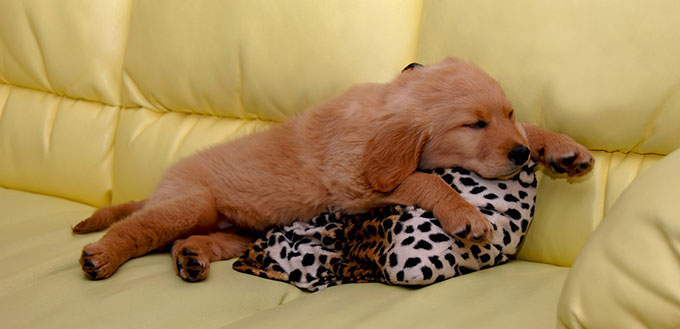
Final Thoughts
Training your puppy to sleep through the night can be a long and time-consuming task, but it is one that any new dog owner is going to have to go through. You need to be prepared to deal with it in the best way possible. This means creating the right sleeping environment for your pooch, getting them ready for bed every night, and ensuring that they have enough mental and physical stimulation through the day. It also means preparing yourself for nights of interrupted sleep. But your four-legged friend it worth it, after all!
More Pet Product Reviews
Dog Hair Brooms
Heated Dog Beds
Wheelchairs For Dogs
Dog Gates
Dog Poop Bags
Raised Dog Bowls
Pee Pads for Dogs
Dog Stairs for Bed
Washable Dog Beds
Sources:
- Chris Miksen, How to Get a New Puppy to Sleep, The Nest
- Claire Youngerman, House-Training your Puppy, UC Davis Veterinary Medicine


